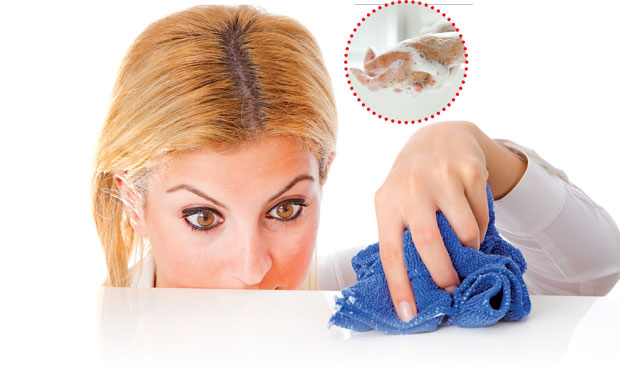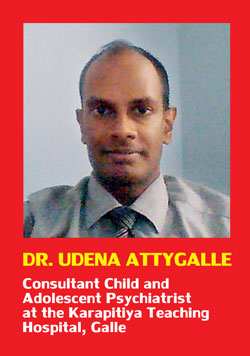29 Dec 2016 - {{hitsCtrl.values.hits}}

 Certain behavioral patterns deemed to be ritualistic and recurrent in an individual can be a telling sign that the person in question may be a victim of Obsessive Compulsive Disorder (OCD). Speaking to Daily Mirror, Dr. Udena Attygalle, Consultant Child and Adolescent Psychiatrist at the Karapitiya Teaching Hospital, Galle, stressed the need to provide proper treatment for OCD patients; in an attempt to avoid the recurrent behaviour evident in such patients. Explaining the intricacies related to OCD, Dr. Attygalle also highlighted that the peak age of onset for this condition falls during early adulthood. Excerpts of the interview are given below.
Certain behavioral patterns deemed to be ritualistic and recurrent in an individual can be a telling sign that the person in question may be a victim of Obsessive Compulsive Disorder (OCD). Speaking to Daily Mirror, Dr. Udena Attygalle, Consultant Child and Adolescent Psychiatrist at the Karapitiya Teaching Hospital, Galle, stressed the need to provide proper treatment for OCD patients; in an attempt to avoid the recurrent behaviour evident in such patients. Explaining the intricacies related to OCD, Dr. Attygalle also highlighted that the peak age of onset for this condition falls during early adulthood. Excerpts of the interview are given below.
QWhat is Obsessive-Compulsive Disorder and how does OCD affect the well-being of an individual?
The core feature of Obsessive Compulsive Disorder (OCD), are recurrent and intrusive thoughts that are distressing to the patient. Sometimes the thoughts themselves may get lost with time, leaving behind a ritual (washing hands ten times before and after eating) that the patient can’t get away from.
When the thoughts are present, those with OCD try to resist them, only to see them come back again after some time. Unlike in psychosis, those with OCD are able to understand that although intrusive, these thoughts are their own and not put in their head by someone else. While this is a simple elaboration of the condition, it is a very complicated condition that is sometimes associated with other conditions such as depression, anxiety and Attention Deficit Hyperactivity Disorder in children.
While we all have thoughts that are bothersome and recurrent (e.g. coming back to check whether the door is locked before you leave on a trip), for those with Obsessive Compulsive Disorder these thoughts are disabling and affect their day-to-day functioning. For example, someone with recurrent thoughts of contamination, might spend long hours thinking about how not to get their hands dirty. They may also have elaborate and time consuming rituals to clean their hands once they get dirty. For a child, this would be a huge distraction from schoolwork. Thus the whole process becomes distressing for the afflicted person and affects the way they do things in their day-to-day life.
QWhat are the symptoms of OCD and how do you diagnose a patient?
The symptoms we see will invariably vary with the type of recurrent thoughts the person has. The common themes could be cleaning/contamination, symmetry, hoarding and “forbidden” thoughts of a religious, aggressive or sexual nature. So while hand washing may be associated with contamination, keeping thing in painstaking order may be associated with symmetry. Forbidden thoughts may be associated with a wide range of behaviours, for example if the thought is sexual they may avoid being in contact, or be angry with the person the thoughts relate to, for no apparent reason.
Diagnosing OCD should be done by a person with experience in doing so. This is due to it being a complicated condition that is sometimes difficult to unravel. Having a Psychiatrist or a Child Psychiatrist in the case of a child confirm the diagnosis would be appropriate.

QWhat are the risk factors/ causes leading to OCD and do genetics play a role with regard to being diagnosed with OCD?
OCD has a high heritability, meaning that genetic factors are a major contributor. However, these factors are not simple but very complex genetic associations. Anomalies in neurotransmitter and firing of neuronal circuits in the brain are also thought to be contributory factors.
QWhat is the vulnerable age group diagnosed with OCD?
The peak age of onset for this condition is in early adulthood. However, about 50% of development symptoms can be observed during childhood and adolescence but may not have been identified. The onset of the disorder happens earlier in males than in females, which leads to more children with the condition being male.
Furthermore, most children with OCD are not able to identify the distressing thoughts but engage in recurrent activities that are difficult to stop. As children and their parents themselves may not be able to understand the condition, such children may get into trouble at home and at school. For example, the child who erases frequently because he wants to get every letter perfect, may be good in class but may get into trouble during a timed exam. Some children although aware of these obsessive thoughts, may keep them hidden because they may believe that the thoughts are bad, especially in the case of those with sexual content.
QWhat kind of treatment or therapy is available for patients with OCD?
For OCD that is mild, Cognitive Behaviour Therapy (CBT) may be useful. In this form of therapy, an attempt is made to put in place behavioral strategies that help the child get used to tolerating the intrusive thoughts. For example, a programme to help the child with excessive hand washing would look at sensitizing him to having dirty hands. At a different level, CBT may also be used to help deal with the thoughts themselves. However in the case of children, CBT has to be adapted in a manner relevant to the child’s age.
With more severs forms of the disorder, medication has a significant benefit. However, medication may sometime take months to develop maximum benefit. Thus it is important to continue to take these medications regularly. A combination of the above 2 forms of treatment as well as supportive measures too can be helpful.
QCan OCD be prevented?
As OCD tends to have a mostly waxing and waning course, proper treatment taken for the appropriate duration can prevent recurrences. Another aspect of OCD that can be prevented is the secondary consequences of OCD. A child could be being made fun of because of his rituals. He could have failing grades because of the need to get every letter perfect and he can’t finish on time. Thus such a child may feel depressed, refuse to go to school and struggle with friendships. All these could, to a certain extent, be prevented by proper treatment of OCD.
25 Dec 2024 7 minute ago
25 Dec 2024 13 minute ago
25 Dec 2024 23 minute ago
25 Dec 2024 59 minute ago
25 Dec 2024 3 hours ago